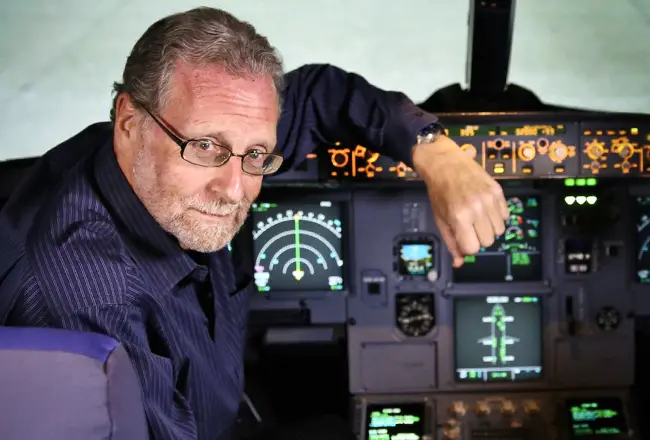
Airports such as Westchester County, Tweed-New Haven and Hartford’s Bradley International stand a good chance of seeing airline activity increase above pre-Covid levels as the pandemic winds down and air carriers add new routes, according to Peter Greenberg, the travel editor for CBS News.
The author of numerous travel books and publications had just returned to New York from a mid-December trip to Istanbul when the Business Journal asked him about possible long-term impacts from the recent elimination of routes by the legacy national airlines.
“As the federal bailout money ended for the major airlines, American, Delta and United no longer were required to fly their route system as was part of the deal for getting that money. They had to keep everybody on payroll and fly their route system. When those provisions ended, each airline announced about 30 different cities they were no longer going to keep on their schedules,” Greenberg said.
“They were dropping cities: Springfield, Illinois; Roswell, New Mexico; Hartford, Connecticut or New Haven. On the surface you would think this spelled doom and gloom for the smaller airports and the people living in those communities would then have to drive hours to get to an airport just to begin their trip.”
Greenberg said that instead of too much doom and gloom, the void has started to be filled by smaller air carriers seeking to become bigger.
“Who showed up to fill that void? People you never would have expected: Frontier; Allegiant; Spirit; and Southwest,” Greenberg said. “In a typical year, Southwest Airlines might have added one new route, one new city. They just announced 12 of them. Frontier just announced 19 of them. And, Spirit and Allegiant are about to make their announcements soon. They see this as an opportunity because of what’s going to be coming back first. It’s not business travel. It’s leisure travel, and those are leisure travel airlines.”
JetBlue in the past couple of months added two dozen city pairs to its route structure, including on Dec. 18 the addition of nonstop flights between Bradley International and Los Angeles, San Francisco and Las Vegas. In November, it had added flights to Cancun, Mexico, from the Hartford airport.
Greenberg said there has been a radical shift in travel behavior regarding where people are going.
“In the old days, people would pick a vacation destination that served their vacation destination needs. That’s all changing now,” Greenberg said. “Now, they’re picking a destination that serves their lifestyle needs, their work-life balance needs. In many cases, you’re seeing entire families moving as a unit for long-term stays in a distant location where they don’t have to commute, where the parents can work remotely, the kids can learn remotely. They can do all the social distancing they want, they’re saving money because nobody’s commuting, they’re not going out to restaurants every night.”
Greenberg said that costs for that type of travel can be as low as $30 per person per day.
“You can’t wake up in Westchester for that. When you think about it, we may see some long-term implications here based on something that nobody planned,” Greenberg said.
Greenberg said he was forced to curtail his usual travel activities for about six months due to the pandemic but recently has been able to travel domestically as well as to such overseas destinations as the Dominican Republic and Croatia.
“The worst four letter word that starts with ‘F’ when it comes to travel is ‘fear,’ and we have a loss of trust out there now, we have a loss of confidence and we have fear. That’s a trifecta for people staying home and I try to mitigate that with facts,” Greenberg said.
“I’ve done stories on the air circulation systems on jets before the pandemic. They’re phenomenal. The HEPA filtration system works better than any in your home or anything even in a hospital because cold air comes into the plane at minus 60 degrees. It’s brought into the engines and then heated, brought into the airline cabin, and purged out every three minutes and replaced. You can’t get a better deal than that,” Greenberg said while pointing out a problematic fact of life about airliners.
“Airline cabins and social distancing are mutually exclusive to begin with. You can’t widen the cabin. You’re not going to get six feet of lateral separation. Even if you block the center seat the distance between you and the window seat and me and the aisle seat is still only 25-inches and it doesn’t even take into account the guy sitting behind you 14-inches away who just sneezed. So, it’s a nice optic for the airlines to block the middle seat and Southwest and Alaska and JetBlue have done that although all three of those airlines are ending that program at the end of this month. Delta is the only exception; they’re going to continue through the end of March.”
Greenberg said it will be interesting to see if keeping the middle seats empty gives Delta a sales advantage over legacy carriers American and United that are selling those seats.
He suggested that three major things need to happen before travel activity returns to pre-Covid levels.
“One is rapid-response, reliable, widespread testing and I’m talking about a biometric approach that will ‘zap’ you at every touch point in your trip whether you’re going to the grocery store or Mongolia and let you know within 45 seconds whether you’re positive or negative and then have the infrastructure built-in to take care of you if you actually test positive. We’ll get used to it the way we take our shoes off at the airport security checkpoint,” Greenberg said. “The other two issues are ill will and trust, and that’s where the travel industry needs to do a much better job.”
As examples of ill will, he pointed to the experiences of travelers who had booked trips and purchased travel insurance only to discover that the fine print excluded coverage for trips canceled because of a pandemic and, because of Covid-19, they were out of luck when it came to getting a refund.
As an example of customers losing their trust that business will do the right thing, Greenberg pointed to the estimated $9 billion being withheld by airlines, hotels, cruise lines and tour operators from customers seeking refunds due to changes in travel plans caused by Covid.
“Put yourself in the position of the consumer. Who wants to give an interest-free loan to the airlines or the cruise lines for two years? They want their money back. So, what’s going to incentivize them to reserve another ticket and pay more money if they’re not given a guarantee,” Greenberg said. “The three things that we have to deal with are the medical issues, and the ill will issues and the trust issues. They all can be handled. The people running these companies have to realize it’s not how much it costs, its how much it’s worth. If you want people to come back and travel you have to give them a security blanket or a guarantee that covers those three areas. When you do that, people will come back exponentially. The travel industry won’t be able to handle the numbers so many people will want to travel at that point.”
Since 1981, Greenberg has flown about 21 million miles, previously reporting for Today on NBC as well as the cable networks CNBC and MSNBC.
“To me, it’s investigative reporting about the process of travel,” Greenberg said. “Nobody needs me to tell them that Brazil is beautiful. Somebody else can do that. I’m about telling you the things you need to know so you can get there and get home.”






















